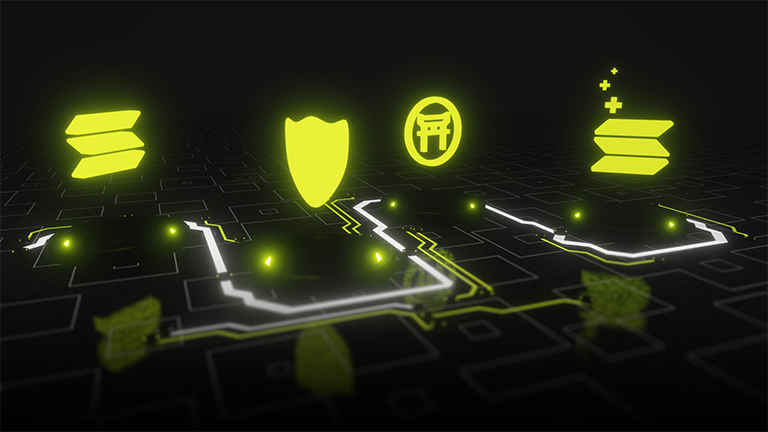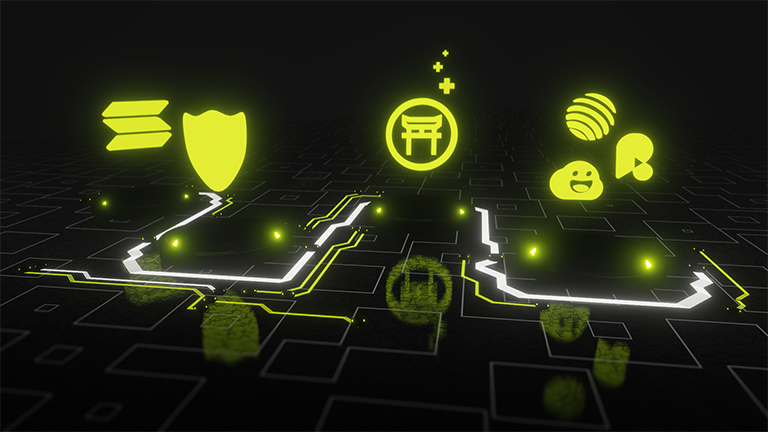Learn more about the process of staking your SOL with Stronghold. Choose between native staking or liquid staking, and explore the range of applications and benefits each provides.
Native Staking
What is Staking?
Staking SOL on the Solana blockchain supports transaction validation and network security. By staking with Stronghold, users delegate tokens to a validator, earning rewards in SOL while enhancing decentralization and network efficiency.

How Native Staking Works
- Delegation: Delegate SOL to Stronghold. Validator gains voting power but not ownership.
- Validator Role: Stronghold processes transactions, produces blocks, and secures the network.
- Earning Rewards: Earn proportional rewards distributed every epoch.
- Unstaking: Unstake SOL with a cooling-off period before withdrawal.

Liquid Staking
What is a Liquid Stake Token?
StrongSOL, our Liquid Staking Token, offers the rewards of traditional staking while retaining liquid tokens that can be held directly in your own wallet. Watch your StrongSOL increase in value, or put it to use in DeFi activities with our partners.

How Liquid Staking Works
- Staking and Issuing LSTs: Stake SOL and receive StrongSOL, a tradable token for DeFi use.
- Validator Role: Stronghold processes transactions, produces blocks, and secures the network.
- Earning Rewards: Rewards differ from native staking and are distributed directly.
- LST-Fi Ecosystem: Use StrongSOL in DeFi for lending, liquidity provision, and more.

Why It's Important to Stake Your SOL
Network Security
Increases network security by making attacks costly.
Decentralization
Distributes validation power, preventing centralization.
Passive Income
Earn rewards and grow holdings over time.
Community Support
Supports Solana’s growth and sustainability.
Risks
Validator Performance Risk
- Rewards depend on validator performance. If your chosen validator underperforms or experiences downtime, your rewards could be reduced or lost. At Stronghold we pride ourselves on a 99.9% uptime and high performant validator on the latest mainnet release.
Lock-Up & Liquidity Risk
- When you native stake SOL, it enters an activation phase that typically lasts a few epochs (each epoch is roughly 2 days). Similarly, unstaking SOL requires a deactivation period, meaning your tokens remain locked and cannot be immediately accessed or traded, which could be a risk if market conditions change suddenly. If this is a concern, you can hold StrongSOL safely in your wallet without needing to wait for the activation phase.
Market and Inflation Risk
- The Solana network mints new SOL tokens regularly, which are distributed as staking rewards. However, if the demand for SOL does not keep pace with this inflation, the value of your holdings may decrease over time, impacting the real-world value of your staking rewards. By ensuring to delegate your stake to Stronghold, you can ensure you are beating the inflation rate with your yield!
Delegation Risk
- Delegating your SOL to a validator means trusting them to act in the best interest of the network. If a validator makes poor decisions, such as engaging in risky behavior or not keeping up with network upgrades, it could result in lower rewards or other penalties. By staking with Stronghold you can be sure you are staking with a Solana Foundation approved validator, which is chosen for its track record of performance and integrity.
FAQ

The minimum amount of SOL required for native staking is 0.00228 SOL, which is used as rent to create the stake account.
It takes 2-3 epochs (approximately 2-3 days) to activate or deactivate your SOL tokens after initiating the process.
Most LSTs that Sanctum support [including StrongSOL,] use a version of the SPL stake pool program 4. Multiple security firms have audited the stake pool program nine times to ensure total safety of funds. So far it has controlled $1B+ of value over more than two years, with no exploits found. Of course, just because a contract has not been exploited in the past does not mean it will never ever be exploited in the future, but it is clear that the stake pool program is one of the safest programs in the world. – https://learn.sanctum.so/guides/user-guides/lsts/lsts-faq
Holding StrongSOL allows you to use your staked SOL tokens in DeFi applications, earn rewards, and maintain liquidity.
Staking rewards are distributed at the end of each epoch (approximately every 2-3 days).
The staking rewards from that SOL accrue to the StrongSOL token, which starts at 1:1 with SOL and grows in value over time. By simply holding StrongSOL, you earn staking rewards!